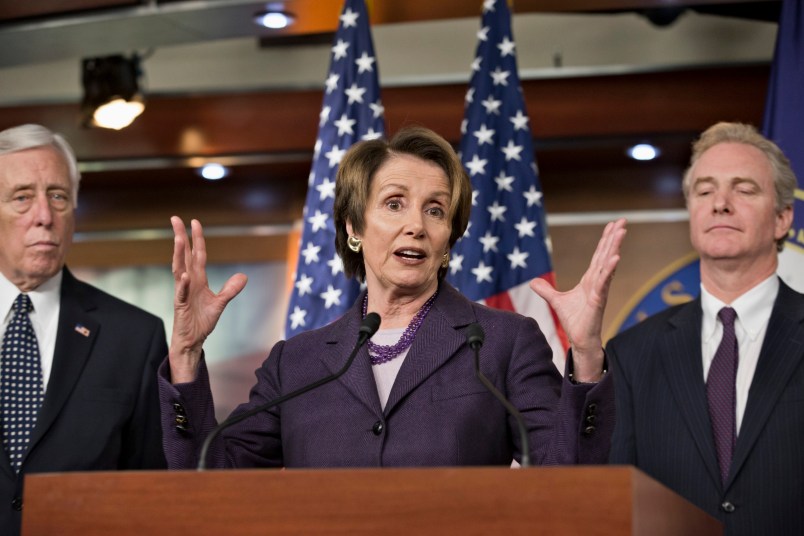House Democrats left town on Friday divided and with a cloud of uncertainty hanging over their heads about whether they’ll participate in or boycott the GOP-led select committee to investigate the Benghazi attacks of 2012.
There are strong views on both sides of that internal debate, and while Democratic leaders haven’t made any final decisions, the mood of the conference has shifted somewhat in recent days from boycott to participation, sources say.
Democrats don’t “want to legitimize a process that has been completely partisan for the last year and a half,” said a senior Democratic aide, “but on the other hand, if Democrats are not in these interviews and seeing these documents, it is much harder to respond to false allegations.”
The pro-boycott school of thought, which House Minority Leader Nancy Pelosi (D-CA) has been sympathetic to, is that participation would “legitimize” what they universally believe will be a partisan witch-hunt aimed at tarnishing the Obama White House and Hillary Clinton ahead of an expected 2016 presidential bid. On Friday, Pelosi called the probe a “political stunt.”
But now that Speaker John Boehner (R-OH) has rejected Pelosi’s demands to give Democrats equal membership and power on the panel, they’re left with a difficult choice. In the near term a boycott could be an effective messaging tool to portray the investigation as a political exercise. But as numerous Democrats have warned, refusing to participate carries its own risks.
Eventually the focus will turn to the work of the committee, and there is substantial concern that if Democrats don’t claim their seats at the table Republicans would have free rein to issue subpoenas and make allegations without rebuttals or cross-examination. And so the momentum among Democrats has shifted somewhat toward participation.
Democrats outlined three concerns with the protocols of the committee, which will have 7 Republicans and 5 Democrats: the majority can issue subpoenas without consulting the minority, they can exclude minority staff from witness interviews, and they can deny the minority equal access to witnesses.
Republican leaders, by contrast, are concerned that if they accede to Democrats’ demand that they be in the room for every witness interview, Democrats could essentially shut down the investigation on any given day by refusing to send a member to an interview.
Speaker John Boehner (R-OH), who announced the 7 GOP members on Friday, is ready to initiate the work of the committee.
“We made a fair offer and we hope that Democrats will appoint members,” said Michael Steel, Boehner’s spokesman. “At this point it’s time to get to work.”







its simple-BOYCOTT.
If not send 1 super sharp representative to check or assist witnesses like the rep. from the Northeast recommended.
I’m against the whole idea of a boycott.
Trey Gowdy is treating this committee as a trial, which means he’s a prosecutor in search of a conviction. The witnesses need an adequate defense, and it would be a great disservice for them to be harassed by the 7 Republicans without Democrats defending them.
Nancy should pick 5 of the sharpest Democrats and make the Republicans look bad. Use their own political game against them, a boycott would play into the Republican game of “Democrats have even MORE to hide.”
Grow a pair and boycott the fucking thing. IT"S A SETUP! YOU CAN"T WIN! Don’t play.
if the Dem reps participating will get an equal amount of time to any Republicans to ask questions, then they should be there. If it will be run like an Issa committee where they will be told to shut up and the hearing shut down when they try to speak, they should boycott.
Either way, though, the proper resonse would be for Harry Reid to set up a Senate special committee to do the same thing–with a majority of Dems, of course–so that they can also file a report.
OR, that would force a compromise of having a single joint committee with an equal number of Dems and Republicans, from both House and Senate.
I’m inclined to agree with you but if the rules are that the majority can issue subpoenas without consulting the minority, exclude minority staff from witness interviews, and deny equal access to witnesses then they may as well boycott.
ETA: Under those terms it’s not an investigation, it’s a Russian style show trial.